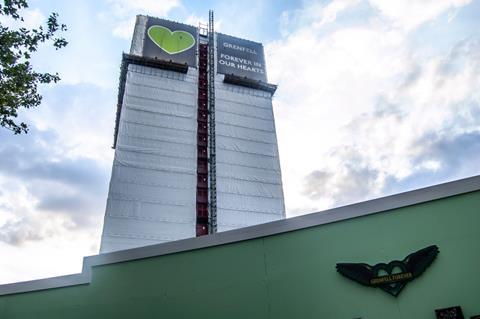Common Wealth advocates fines of up to 10% of global turnover for offending firms
Legal frameworks for corporate accountability must be reformed to prevent another Grenfell, a think tank has argued.
In a briefing released to mark the eight anniversary of the fire, which killed 72 people, Common Wealth said stronger sanctions and stricter tests for breaches of the law needed to be introduced.

The briefing addressed the “difficulty in holding corporate actors accountable within current English law frameworks”.
It suggested a different approach, which it said might prove “more effective both for Grenfell, and for future contexts of corporate misconduct”.
Common Wealth, a progressive research organisation, said the difference in scale between the £150m settlement, agreed between 22 defendants and the survivors and bereaved in 2022, and Arconic’s annual turnover of £6.6bn in the same year.
Arconic was one of three manufacturing firms, along with Celotex and Kingspan, that was slammed in the Grenfell Inquiry report for its actions prior to the fire.
“A lack of robust corporate accountability mechanisms in English law makes it difficult to draw direct links between implicated firms and the fire, obscuring their involvement, relations and responsibility,” said Common Wealth.
It contrasted corporate accountability law with the Corporate Sustainability Due Diligence Directive (CSDDD) introduced in the European Union, as well as a mandatory due diligence law adopted in Thailand and supply chain legislation implemented in France, Germany and Norway.
Currently, three causes of action can be used to pursue corporations for misconduct in the UK: corporate negligence, corporate manslaughter and gross negligence manslaughter.
Common Wealth identified a number of problems with the existing set up, including the lack of duty of care owed for upstream harms, the evidential hurdles required to prove grossly negligent conduct within complex organisations, and the difficulty in identifying responsible actors.
With regard to the second point, the think tank noted that in some cases, “smaller, acceptable action” can “cumulatively amount to an overall breach”.
“Legal frameworks that aim to pinpoint exactly when and how a certain threshold was crossed (“what was the ‘breach’ of the duty of care”) therefore focus too much on the scale of the individual act, and, as a result, do not always capture the more systemic orientation of corporate malpractice,” it said.
Better accountability would require legal frameworks that more accurately map corporate structures, intervene sooner and provide more effective sanction for breach, according to the think tank.
For instance, the EU’s CSDDD requires companies to install a complaints procedure so that trade unions and worker representatives can submit concerns regarding adverse supply chain impacts.
It also suggested that rewards for whistleblowers, which are currently available for those reporting on tax issues, could incentivise actors to “play by the rules”.
It said severe sanctions already exist for certain corporate breaches, giving the example of the Bribery Act 2010, which allows corporate debarment, unlimited fines and disqualification of directors for two to fifteen years.
“Extending such penalties to contexts like Grenfell, without the high threshold required by corporate manslaughter, would significantly deter corporations from activities that fall within their scope,” it said, recommending a fine of up to 10% of an organisation’s global turnover.
It also suggested that more “invasive” tests for breaches of law could be introduced, again citing the Bribery Act, which adopts a ‘failure to prevent’ model.
Such a standard would require firms to take a proactive approach in order to avoid penalties.























No comments yet